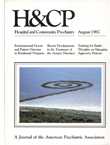Therapeutic Alliance and Hospital Treatment Outcome
Abstract
The effect of therapeutic alliance on treatment outcome in a stratified sample of 96 hospital inpatients was assessed by means of a 6-point alliance scale as well as by demographic, treatment history, and psychopathological data. Alliance was correlated with improvement at discharge but not with demographic or prior treatment characteristics. Symptom patterns and personality dysfunction were shown to be differentially related to the quality of the alliance. Patients with axis I substance abuse, adjustment, and somatoform disorders had the poorest alliance and the poorest outcomes. The authors generated a model to predict outcome of hospital treatment, using patient alliance ratings, axis I and II diagnoses and their combinations, and admission Global Assessment Scale scores.
Access content
To read the fulltext, please use one of the options below to sign in or purchase access.- Personal login
- Institutional Login
- Sign in via OpenAthens
- Register for access
-
Please login/register if you wish to pair your device and check access availability.
Not a subscriber?
PsychiatryOnline subscription options offer access to the DSM-5 library, books, journals, CME, and patient resources. This all-in-one virtual library provides psychiatrists and mental health professionals with key resources for diagnosis, treatment, research, and professional development.
Need more help? PsychiatryOnline Customer Service may be reached by emailing [email protected] or by calling 800-368-5777 (in the U.S.) or 703-907-7322 (outside the U.S.).



